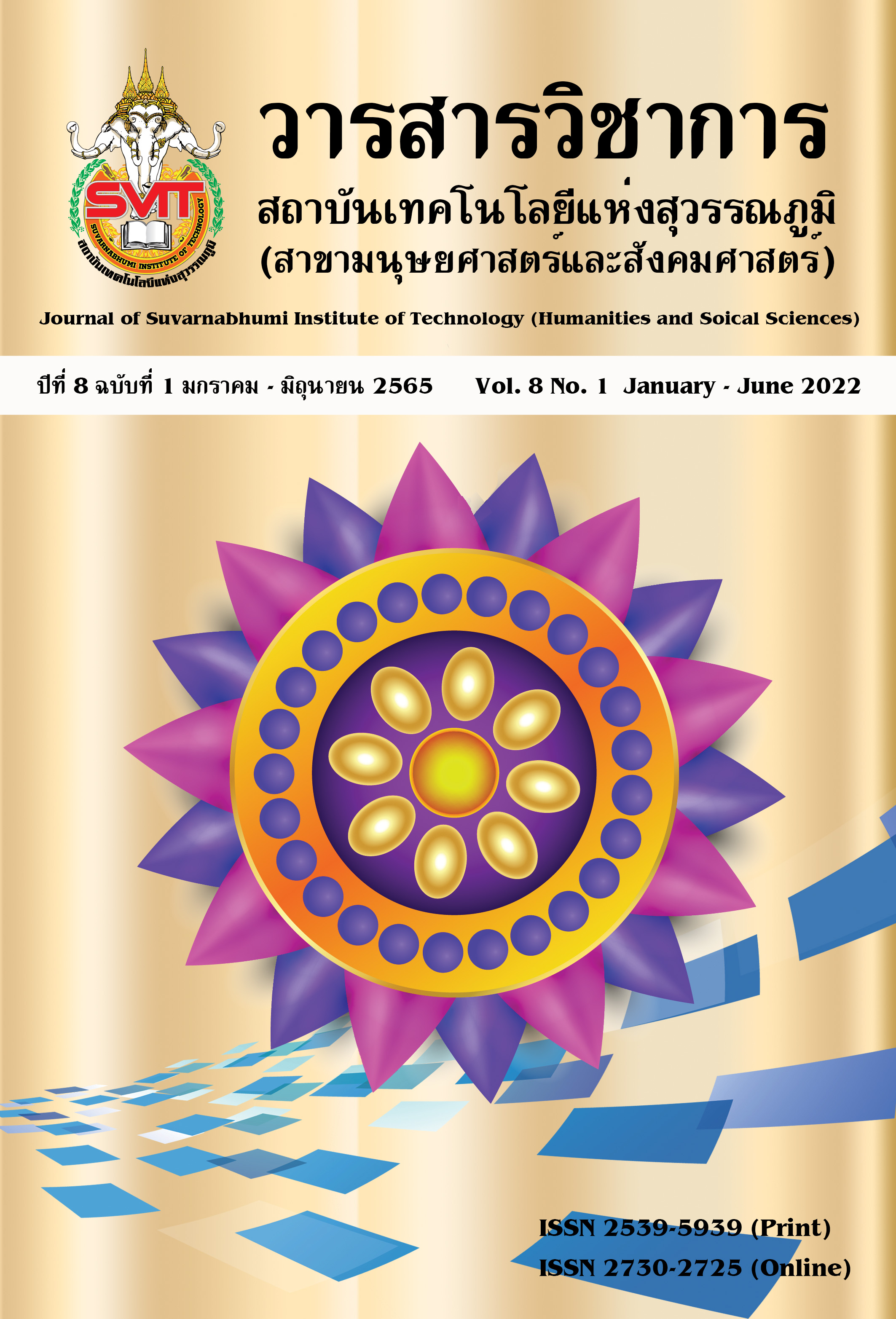การพัฒนารูปแบบการท่องเที่ยวเชิงอาหารโดยชุมชนในประเทศไทย
คำสำคัญ:
การท่องเที่ยวเชิงอาหาร , การท่องเที่ยวโดยชุมชน , ห่วงโซ่คุณค่า , การสร้างคุณค่าร่วมกันบทคัดย่อ
บทความนี้มีวัตถุประสงค์เพื่อ (1) เพื่อศึกษาองค์ประกอบสำคัญในการสร้างคุณค่าของการท่องเที่ยวเชิงอาหารของชุมชน (2) เพื่อศึกษากระบวนการสร้างคุณค่าร่วมระหว่างผู้มีส่วนได้ส่วนเสีย ในบริบทของการท่องเที่ยวโดยชุมชน (3) เพื่อพัฒนารูปแบบการท่องเที่ยวเชิงอาหารโดยชุมชนในประเทศไทย โดยใช้แนวคิดเชิงบูรณาการระหว่างการท่องเที่ยวเชิงอาหารและห่วงโซ่คุณค่า โดยใช้กระบวนวิธีการวิจัยเชิงคุณภาพ (qualitative research) ได้แก่ การสัมภาษณ์เชิงลึกและการสังเกตอย่างมีส่วนร่วม กลุ่มตัวอย่างที่ใช้ในการศึกษาครั้งนี้ ประกอบด้วย กลุ่มเกษตรกรและคนในชุมชน องค์กรบริหารส่วนท้องถิ่น ผู้ประกอบการด้านอาหารในชุมชน และนักท่องเที่ยว ใน 3 ชุมชน ได้แก่ ชุมชนหมู๋บ้านแม่ทา ชุมชนหมู่บ้านไผ่ดำพัฒนา และชุมชนหมู่บ้านไร้แผ่นดิน ผลจากการศึกษา พบว่า 1. องค์ประกอบสำคัญ 4 ด้าน ดังนี้ 1) การท่องเที่ยวโดยชุมชน (CBT) 2) ภูมิปัญญาและมรดกทางอาหาร 3) ผู้ประกอบการการท่องเที่ยวเชิงอาหาร และ 4) ประสบการณ์การท่องเที่ยวเชิงอาหาร 2. กระบวนการสร้างคุณค่าร่วมกัน พบว่า 3 กระบวนการ คือ 1) กระบวนการค้นหาและเข้าใจวัฒนธรรมและอัตลักษณ์อาหารของตน 2) กระบวนการสร้างคุณค่าที่ส่งมอบให้กับนักท่องเที่ยวให้ได้สัมผัสกับเดิมแท้ของอาหารท้องถิ่น 3) กระบวนการสร้างคุณค่าให้อาหารส่งเสริมภาพลักษณ์การท่องเที่ยวเพื่อให้ผู้มีส่วนได้ส่วนเสียเกิดการรับรู้และเข้าใจคุณค่าของการท่องเที่ยวเชิงอาหาร โดยผ่านกระบวนการเรียนรู้และยอมรับวัฒนธรรมท้องถิ่น และวัฒนธรรมของนักท่องเที่ยว และ 3. รูปแบบการพัฒนาการท่องเที่ยวเชิงอาหารโดยชุมชน สร้างคุณค่าร่วมให้กับผู้มีส่วนได้ส่วนเสียในการท่องเที่ยวเชิงอาหารโดยชุมชน ทำให้ชุมชนได้รับคุณค่าที่ยั่งยืนจากการท่องเที่ยว
เอกสารอ้างอิง
สำนักงานปลัดกระทรวงการท่องเที่ยวและกีฬา. (2560). แผนการท่องเที่ยวแห่งชาติฉบับที่ 2 (พ.ศ. 2560 ถึงพ.ศ. 2564). กรุงเทพฯ: การท่องเที่ยวแห่งประเทศไทย กระทรวงการท่องเที่ยวและกีฬา.
ยศ สันตสมบัติ. (2547). การท่องเที่ยวเชิงนิเวศ: ความหลากหลายทางวัฒนธรรมและการจัดการทรัพยากร (พิมพ์ครั้งที่ 2). กรุงเทพฯ: โครงการพัฒนาองค์ความรู้และศึกษานโยบายการจัดการทรัพยากรชีวภาพในประเทศไทย.
รัฐนันท์ พงศ์วิริทธิ์ธร. (2556). แนวทางการพัฒนาการท่องเที่ยวเชิงวัฒนธรรมชนเผ่าเพื่อความยั่งยืน. Journal of Community Development, 6(1).
วรภพ วงค์รอด. (2557). แนวทางการจัดการท่องเที่ยวเชิงวัฒนธรรมแบบมีส่วนร่วมของชุมชนวัฒนธรรมในพื้นที่จังหวัดนครสวรรค์. วารสารวิชาการและวิจัยสังคมศาสตร์, (26), 13-28.
Alba, R., P, A., K, P., Fonari, N., Anderson, E., & Glazer, N. (2000). Beyond the Melting Pot 35 Years Later: On the Relevance of a Sociological classic for the Immigration Metropolis of Today. The International Migration Review, 34(1), 243.
Bruner, E. (1991). Transformation of self in tourism. Annals of Tourism Research, 18(2), 238-50.
Cohen, E. (1979). A phenomenology of tourist types. Sociology, 13(2), 179-201.
Cohen, E., Avieli, N. (2004). Food in tourism: Attraction and impediment. Annals of Tourism Research, 31(4), 755–778.
Equations. (2008). Community-Based Rural Tourism in Developing Countries. Some Insights and Lessons from the Endogenous Tourism Project in India. In Making a Difference. Dossier on Community Engagement on Nature Based Tourism in India. Equations, ed. (pp. 62–68). Bagalore: Equations.
Food World food Travel Association. (2016). Food Travel Monitor research report. Retrieved April 21, 2022, from www.foodtravel.org.
Fitter, R. & Kaplinsky, R. (2001). Who gains from product rents as the coffee market becomes more differentiated? A value chain analysis. IDS Bulletin Paper (May).
Gereffi, G. & R. Kaplinsky (eds.) (2001). The Value of Value Chains. IDS Bulletin, 32(3).
Giampiccoli, A., & John, N. (2010). Problems and Prospects for Community-Based Tourism in the New South Africa: The 2010 FIFA World Cup and Beyond. African Historical Review, 42(1), 42–62.
Gretzel, U., Fesenmaier, D. R., & O’Leary, J.T. (2006). The tranformation of consumer behavior. In D. Buhalis & C. Costa (Eds.), Tourism business frontiers: Consumers, products and industry (pp.9-18).
GTZ. (2007). Tourism Residential Models and Alleviation of Poverty. Managna: GTZ German Coooperation.
Harrington R. & Ottenbacher M. (2010). Culinary Tourism-A case study of the Gastronomic Capital. Journal of Culinary Science & Technology, 8(1), 14-32.
Hegarty J., & Barry G. (2001). Gastronomy: A phenomenon of cultural expressionism and an Aesthetic for living. Journal of Hospitality & Tourism Education, 11, 25-29.
Hwang, W. & Chen. (2005). Constructing the Green Supply Chain for Rural Tourism in China: Perspective of Front–Back Stage Decoupling. Sustainability 2018, 10, 4276-4282
Jennifer Bair & Enrique Dussel Peters. (2006). Global commodity chains and endogenous growth: Export dynamism and development in Mexico and Honduras. World Development, 2(34), 203-221.
Kaplinsky R. (2000). Spreading the gains from globalisation: What can be learned from value chain analysis?. Journal of Development Studies, 37(2), 117-146.
Kaplinsky, R. (2002). Gaining From Global Value Chains: The Search For The Nth Rent. In G. Gereffi (ed.), Who Gets Ahead in the Global Economy? Industrial Upgrading, Theory and Practice. New York: Johns Hopkins Press
MacCannell, D. (2002). The ego factor in tourism, Journal of Consumer Research, 29, 146-151.
Matta, R. (2013). Valuing Native Eating: The Modern Roots of Peruvian Food Heritage. Anthropology of food, S8.
Mitchell , R, & Hall, C.M. (2006). Wine tourism research: the state of play. Tourism Review International, 9(4), 307-332.
Mitchell, J., & Caroline, A. (2010). Tourism and Poverty Reduction. Pathways to Prosperity. London: Earthscan.
Moscardo, G. (ed). (2008). Building Community Capacity for Tourism Development. CABI, Australia.
Ndlovu, N., & Christian M. R. (2004). The Local Economic Impacts of Rural Community Based Tourism in Eastern Cape. In Tourism and Development Issues in Contemporary South Africa. Christian M. Rogerson and Gustav Visser, (eds.) (pp. 436–451). Pretoria: Africa Institute of South Africa.
Pietrobelli, C. & Rabellotti, R. (2007). Upgrading to Compete. Global Value Chains, Clusters and SMEs in Latin America, Cambridge, MA, Harvard University Press.
Porter M. E. (1985). Competitive Advantage: Creating and Sustaining Superior Performance. New York: The Free Press.
Raikes P., & Gibbon P. (2000). Globalisation and African Export Crop Agriculture. Journal of Peasant Studies, 27(2), 50-93
Ramli, A., & Zahari, M. (2014). Determinants of food heritage in Malaysia context. Theory and Practice in Hospitality and Tourism Research.
Ramli, A. M., Zahari, M. S. M., Halim, N. A., & Aris, M. H. M. (2015). Knowledge and Awareness on Food Heritage in Klang Valley, Malaysia. Paper presented at the AicQoL2015 Jakarta, "Quality of Life in the Build & Natural Environment", AMER International Conference on Quality of Life, Jakarta, Indonesia.
Ramli, A. M., Zahari, M. S. M., & Talib, S. A. (2014). Identification of Food Heritage: Food Identity Analysis on Demographic Background. Paper presented at the National Research & Innovation Conference for the Graduate Students in Social Sciences 2014, Corus Paradise Resort, Port Dickson, Negeri Sembilan.
Richards, Greg. (2002). Gastronomy: An Essential Ingredient in Tourism Production and Consumption? In Tourism and Gastronomy. Anne-Mette Hjalager and Greg Richards, (eds.) (pp. 3–20). London: Routledge.
Richards, G. (2012). Food and the tourism experience: major findings and policy orientations. In Dodd, D. (ed.) Food and the Tourism Experience. Paris: OECD, (pp. 13-46).
Richards, G. (2014). Creating relational tourism through exchange: The Maltese experience. Journal of Hospitality and Tourism, 12(1), 87-94.
Ritchie J. R. B., Hudson S. (2009). Understanding and meeting the challenges of consumer/tourist experience research. International Journal of Tourism Research, 11(2), 11-26.
Ryan, C. (1997). The Tourist Experience: A New Introduction. London: Cassell.
Sebele, L.S. (2010). Community-based tourism ventures, benefits and challenges: Khamahino sanctuary trust, central district, Botswana. Tourism Management, 31(1), 136-146. doi: 10.1016/j.tourman.2009.01.005.
Sims (2009). Food, place and authenticity: local food and the sustainable tourism experience. Journal of Sustainable Tourism, 17(3), 321-336.
Smith, S, Xiao H. (2008). Culinary tourism supply chains: a preliminary examination. Journal of Travel Research, 46(3), 289–299.
Telfer, David J. (2009). Development Studies and Tourism. In The SAGE Handbook of Tourism Studies. Tazim Jamal and Mike Robison, (eds.) (pp.146–165). London: SAGE Publications.
Telfer, David J., & Richard Sharpley. (2008). Tourism and Development in the Developing World. London: Routledge.
Timothy, Dallen J. (2002). Tourism and Community Development Issues. In Tourism and Development Concepts and Issues. Richard Sharpley and David J. Telfer (eds.) (pp. 135–178). Clevedon: Channel View Publications.
Trencher G., Yarime M., & Kharrazi A. (2013). Co-creating sustainability: cross-sector university collaborations for driving sustainable urban transformations. Journal of Cleaner Production, 50, 40-55.
UNWTO. (2012). Tourism Highlights, 2012 Edition. Retrieved July 3, 2013, from http://dtxtq4w60xqpw.cloudfront.net/sites/all/files/docpdf/unwtohighlights12enhr_1.pdf.
UNWTO. (2018). Tourism Highlights, 2012 Edition. Retrieved July 3, 2013, from http://dtxtq4w60xqpw.cloudfront.net/sites/all/files/docpdf/unwtohighlights12enhr_1.pdf.
Uriely, N. (2005). The tourist experience conceptual developments. Annals of Tourism Research, 32(1), 199-216.
Wang, N. (1999). Rethinking authenticity in tourism experience. Elsevier Science Ltd., 26(2), 349-370.
Zapata, M.J., Hall, M.C, Lindo, P., & Vanderschaeghe, M, (2011) Can Community Based Tourism contribute to development and poverty alleviation? Lesson from Nicaragua. Current Issues in Tourism, 14(8), 725-749.
ดาวน์โหลด
เผยแพร่แล้ว
ฉบับ
ประเภทบทความ
สัญญาอนุญาต
ลิขสิทธิ์ (c) 2022 สถาบันเทคโนโลยีแห่งสุวรรณภูมิ

อนุญาตภายใต้เงื่อนไข Creative Commons Attribution-NonCommercial-NoDerivatives 4.0 International License.
บทความที่ได้รับการตีพิมพ์เป็นลิขสิทธิ์ของวารสาร Sarasas Journal of Humanities and Social Science ข้อความที่ปรากฏในบทความแต่ละเรื่องในวารสารวิชาการเล่มนี้เป็นความคิดเห็นส่วนตัวของผู้เขียนแต่ละท่านไม่เกี่ยวข้องกับสถาบันสารสาสน์เทคโนโลยีแห่งสุวรรณภูมิแต่อย่างใด ความรับผิดชอบองค์ประกอบทั้งหมดของบทความแต่ละเรื่องเป็นของผู้เขียนแต่ละท่าน หากมีความผิดพลาดใดๆ ผู้เขียนแต่ละท่านจะรับผิดชอบบทความของตนเองแต่ผู้เดียว




